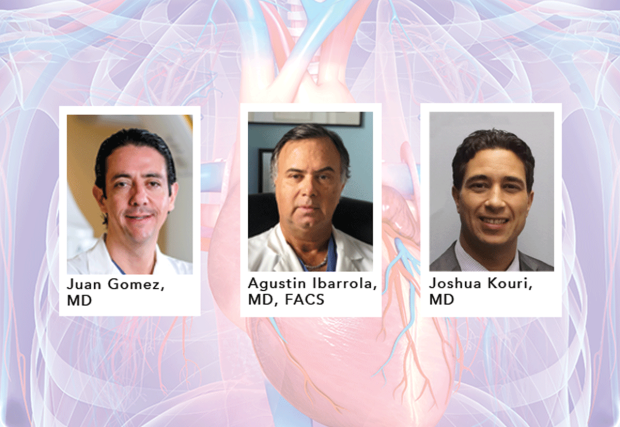If you or someone you love has been diagnosed with an aortic aneurysm, then you may know that this is a dilation of the main artery that runs from the heart through the center of the chestand abdomen. If the abdomen ruptures, this condition has a very high mortality rate.
Certain aortic aneurysms may be managed non-surgically. If a complex medical repair is needed, doctors at Wellington Regional are equipped to deliver high-level treatment. “We have all the different subspecialties capable of treating complicated aortic aneurysm cases, in addition to the ultimate technology to provide superior care,” says Juan Gomez, MD, medical director of the hospital’s Neurointerventional Radiology Program and director of the Vascular Institute. “We’re capable of doing high-end procedures which are rarely performed in a community hospital.”
One team, one goal: A positive patient outcome
Dr. Gomez leads highly skilled teams in providing advanced care, and has worked collaboratively with vascular surgeon Agustin Ibarrola, MD, FACS, and neurosurgery specialist Joshua Kouri, MD, to perform complex aortic aneurysm treatment. As an interventional specialist, Dr. Gomez uses a less-invasive, endovascular approach that involves inserting a catheter through a vessel in the groin or another location, depending on the specific case. With guidance from advanced imaging, a stent is then placed in the affected section of the aorta to reinforce the vessel wall.
Find a doctor at Wellington Regional >
Dr. Ibarrola plays a crucial role by providing access to the vessels and collaborating in these procedures. One of the challenges is making sure that key vessels are not blocked. This may require advanced techniques to preserve essential arteries and maintain blood supply to vital organs.
Depending on the particular repair, other potential complications may arise. In a case where spinal cord injury was a concern, Dr. Kouri placed a lumbar spinal fluid drain to reduce the risk of possible paralysis and stroke, and support a positive outcome.
“Here at Wellington Regional, we’re focused on giving patients the best possible treatment,” says Dr. Gomez. Thanks to advanced care and collaboration, patients may avoid needing to be transferred and instead get the critical care they need right here in the community.
Aortic aneurysms can occur in the chest (thoracic aortic aneurysm) or the abdomen (abdominal aortic aneurysm). Talk with your doctor about your risks and screening recommendations.
Individual results may vary. There are risks associated with any surgical procedure. Talk with your doctor about these risks to find out if minimally invasive surgery is right for you.

